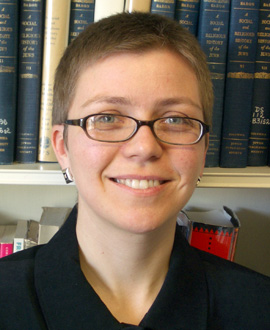Guggenheim Recipient to Pursue Research on Jews, Christians
| Posted 03/16/07 |
| A research grant from the Harry Frank Guggenheim Foundation will allow a Wesleyan faculty member to pursue her research on Jews and Christians in pre-modern Poland.
Teter, pictured at right, was one of eight recipients of the award. She will research the close social interaction between Jews and Christians; the role of lay and religious instigators in exploiting religious sentiments; position of the accused Jews in the community; local economic dynamics; and, the role of gender. She will publish her findings in a tentatively titled book, An Anatomy of Sectarian Violence: Jews and Christians in Pre-Modern Poland. The Guggenheim grant will allow Teter to travel to Rome and Poland to conduct archival research. She plans to work in the General Archives of the Carmelite Order in Rome, the Roman Archive of Society of Jesus, the Secret Vatican Archives, and the Polish Archdiocesan archives in Poznan, Cracow, as well as a number of state archives. This research will be completed throughout the summer and again, for a few weeks during the fall or winter. In today’s world plagued with sectarian violence, roots of such violence have aroused a widespread interest, Teter says. I want to know what makes neighbors rise against neighbors? What’s the role of authorities in incitement or quelling of violence? And who benefits from it? These questions are not limited to modern times but are also pertinent to pre-modern societies, in which religion was crucial in shaping social order. Teters project examines questions of social and religious violence and aggression between the two religious groups by looking at specifically religiously motivated violence aimed at asserting religious dominance of one group over the other. Teter will publish her findings in a book titled An Anatomy of Sectarian Violence: Jews and Christians in Pre-modern Poland. At Wesleyan, Teter has taught classes on Jewish history, Jews among Christians and Muslims, early modern Europe, East European Jewish experiences and senior thesis. In 2000, she received her Ph.D from Columbia University with a dissertation titled, Jews in the Legislation and the Teachings of the Catholic Church in Poland (1648-1772). As a Guggenheim recipient, Teter is required to submit a written report within six months of the end of the grant period. The report includes a discussion of the scientific and scholarly accomplishments achieved under the grant. For more information on the Guggenheim Foundation go to: www.hfg.org. |
| By Olivia Drake, Wesleyan Connection editor |


 Magdalena Teter, assistant professor of history, received the Guggenheim award in March. The foundation makes grants in the natural and social sciences and the humanities that promise to increase understanding of the causes, manifestations, and control of violence, aggression, and dominance. Awards range between $15,000 and $30,000.
Magdalena Teter, assistant professor of history, received the Guggenheim award in March. The foundation makes grants in the natural and social sciences and the humanities that promise to increase understanding of the causes, manifestations, and control of violence, aggression, and dominance. Awards range between $15,000 and $30,000.